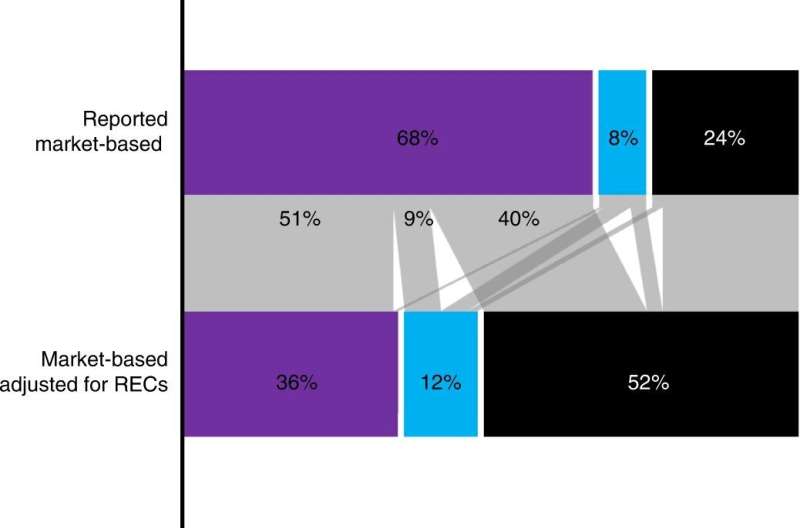June 10, 2022 report
Study: In most cases entities behind Renewable Energy Certificates are not doing much for the climate

A small team of researchers at Concordia University, working with a colleague at the University of Edinburgh Business School, reports that many companies' environmental claims are exaggerated due to their reliance on the purchase of Renewable Energy Certificates (RECs) that do not represent as much mitigation as they claim. In their paper published in the journal Nature Climate Change, the researchers describe their study of publicly available corporate documents from 115 large companies. The same team has also published a Policy Brief in the same journal issue outlining recommended changes to rules governing emissions by corporations and other large entities.
In their work, the researchers looked at documents published by large public entities such as corporations that outline steps to reduce their climate footprints. Such documents generally describe efforts aimed at reducing greenhouse gas emissions. But quite often, they also include records of RECs they have purchased.
RECs are instruments created by entities engaged in activities to reduce greenhouse gas emissions. They certify that the purchaser of the certificate owns a certain amount of electricity generated by a renewable energy source. Large corporations purchase them in lieu of reducing their own emissions as a means of claiming lower emissions levels. In this new effort, the researchers found that the amount of energy reported on the certificates is not always equal to what they claim, which means the claims made by the entities that purchase them are often inaccurate.
The researchers found that overall, the 115 companies were claiming reductions of greenhouse gas emissions of 30% over the years 2015 to 2019. But analysis of actual mitigation revealed the true reductions were only 10%. They also found that many of the entities behind the RECs were actually doing little to mitigate climate change. They suggest the need for new standards governing the sale of certificates and that investors in companies exert more pressure to further reduce their greenhouse gas emissions, rather than rely on RECs to bring their numbers down.
More information: Anders Bjørn et al, Renewable energy certificates threaten the integrity of corporate science-based targets, Nature Climate Change (2022). DOI: 10.1038/s41558-022-01379-5
Anders Bjørn et al, Renewable energy certificates allow companies to overstate their emission reductions, Nature Climate Change (2022). DOI: 10.1038/s41558-022-01385-7
© 2022 Science X Network


















